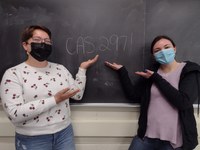Since its establishment in 1935, the Department of Communication Arts and Sciences has been inextricably linked with public speaking, and since 1959, the foundational speech course has been a graduation requirement for all Penn State students. Each semester, the department celebrates this history and the outstanding students our CAS 100A instructors teach each semester by hosting the Civic Engagement Public Speaking Contest. A panel of judges evaluates the competition, and a film crew from Pearson Learning Solutions records the performances. The event is made possible through the generous support of the department and Pearson Learning Solutions.
Speeches from the Spring 2022 Public Speaking Contest Finalists
What is the event like?
The Quarterfinals of the Contest can feature up to 80 contestants, since each section of CAS 100A can send their class-nominated speaker to the Contest. The group is divided into rounds of four to six speakers, each of whom is judged by two CAS 100A instructors. The top speaker from each round moves to the Semifinals, usually two to three rounds of six speakers judged by two CAS 100A instructors. Six speakers advance to the Finals.
The Final Round is held in the Freeman Auditorium in the HUB Robeson Center, and the Contest sees an average attendance of over 200 audience members. The event is live-Tweeted, and our emcee, CAS100 Director, Dr. Bonnie Sierlecki, moderates the event and the live-Tweeting. The panel of judges represents the department, wider academic areas of Penn State, the State College Community, and Pearson Learning Solutions. Campus Catering coordinates the catered reception of various hors d’oeuvres that follows the event.
What are the prizes?
Through the generosity of our sponsors, we award all Finalists with a prize for their engagement. The three Honorable Mention performances receive a $75 gift card to Barnes and Noble Booksellers. The top three speakers receive cash prizes of $300, $200, and $100 for first, second, and third places, respectively.
Past Winners
Though there have been oratory contests at Penn State since the nineteenth century, the Contest in its current form has been a semi-annual event for the department since the early 2000s. Below is a list of more recent Contest winners.
Spring 2021 | Justin Do , “Fixing the National Physician Shortage” Arden Bealmear , ” Beginning Financial Literacy in High School” |
Fall 2020 | Hannah Grzybowski , ” Implicit Bias at Penn State: How We Can Create a More Welcoming Environment” |
Spring 2020 | Public Speaking Contest Canceled
|
Fall 2019 | Dominic Cotner, “Mental Health and Wellness”
|
Spring 2019 | Bhavana Thota, “Ameliorating Undergraduate Premedical Studies to Better Equip Doctors to Care for Patients”
|
Fall 2018 | Lauren Fish, “Increased Integration of General Education and Special Education Students”
|
Spring 2018 | Carolyn Lamb, “The Paycheck Fairness Act: A Solution to the Gender Wage Gap.”
|
Fall 2017 | Celeste Watson-Martin, “STEPS Toward Pedestrian Safety.”
|
Spring 2017 | Rob Torino, “Insufficiencies in USAID and the Place for NGOs”
|
Fall 2016 | Keonna Knight, “Battle with biases: Cultural competency training for teachers.”
|
Spring 2016 | Chahat Sharma, “Going Beyond Safe-Ed Sex Education”
|
Fall 2015 | Mia Sievers, “Preventing the Spread of Antibiotic Resistance”
|
Spring 2015 | Evan Jones, “Linked In or Tuned Out?”
|
Fall 2014 | Terrence Ford, “Overcrowded Prisons and Reform of Our Justice System”
|
Spring 2014 | Nadia Lehtihet, “Medicaid Expansion: Pennsylvania’s Fight for Life”
|
Fall 2013 | Amanda Hofstaeder, “Mandatory GMO Labeling: A Win-Win for Companies and Consumers”
|
Spring 2013 | Kris Stauffer, “Death to Pennies – A How-To”
|
Fall 2012 | Shayna Levenson, “Engineering a Solution to Hospital Acquired Infections”
|
Spring 2012 | Nicholas Gildea, “Anabolic Steroid Use: The Untold Drug Problem”
|
Fall 2011 | Benjamin Ringel, “Social Networking Privacy Problems”
|
Spring 2011 | Jared Smith, “Food Labeling Reform”
|
Fall 2010 | Kevin Shaffer, “Football Head Injuries: a Preventable Crisis”
|
Spring 2010 | Nicole Murray, “Breast Cancer: Triumph over Tragedy”
|
Fall 2009 | Brian Sullivan, “Gay Straight Alliances in American Public Schools”
|
Spring 2009 | Evan Rothey, “So They Can Be Kids Again”
|
Fall 2008 | Paul Langdon, “E-Waste: A Grave Reality”
|
Spring 2008 | Patrick Buckley, “DNA Database Expansion”
|
Fall 2007 | Ben George, “Civic Illiteracy”
|
Spring 2007 | Lauren McDevitt, “C.A.R.E.: Prevent Child Sexual Abuse”
|
Fall 2006 | Jason Traverse, “The Cost of Bad Drivers”
|
Spring 2006 | Rebecca Wilmer, “Too Cool to Be Kind: Raising Awareness of the Media’s Effects on Self-Image”
|
Fall 2005 | Kevin Shaw, “A Policy Analysis on the Pending Renewal of the USA Patriot Act”
|
Spring 2005 | Jigisha Desai, “Gay Marriage: A Right, Not A Sin”
|
